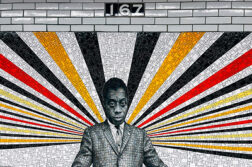The last year of my military life, I was stationed at Fort Hancock in New Jersey. The base was situated on a peninsula jetting out northward from the surrounding highlands into New York Harbor. I took the assignment as a reward for my time at the front.

As a young officer, I enjoyed waterfront quarters, and it was my routine each morning to peel out of the sack and take a dip or two in the ocean surf before heading off for the day. I ran the Adjutant’s office and was rewarded with a number of additional duties. Among them was Headmaster of the enlisted men’s barracks: about 200 young soldiers. Among them were Richard Edwards and Alan Small.
Small was nineteen, a bundle of good looks. If his deep, dark-brown eyes and perpetual smile didn’t get you, his darting personality surely would. He was the huggable type. Edwards was a bit older. Although he didn’t smoke, a cigarette company would give its net worth to have his face on its billboards. Yet he had a heart gentle enough to tame a tiger.
The two enlisted men had recently been co-named “Soldier of the Year.” Edwards and Small had come in “first” and “first”—a dead heat. There was a reason for this: they were inseparable. Whenever and wherever you ran into one of them, you were sure to run into the other. Their work with the homeless in the surrounding community had won them the prize. It was the first time in the history of the post that two awards were given. I know, because I pinned the Commendation Medal on each of their chests.
Of course, we all have our faults. For them, as for so many others in those days, it was beer. The problem was, Alan Small couldn’t keep up with the rest of us. By the time we’d had our full, he was already under the table. In October of that year, Alan was caught driving under the influence. The local headline read: “Soldier of the Year DUI.” Though he had been barely over the limit, the colonel threw the book at him. Three months in the pen.
Each week, I visited the stockade and interviewed Alan. It was a rare day that Richard was not also there. As Christmas approached, the season’s spirit got the best of me. I talked the colonel into letting Small out early. This gesture of kindness has been my fate, I have lived with that decision all the days of my life.
It was Christmas Eve when we got the word. Alan had been beat up by thugs in a parking lot. He had been ambulanced to a hospital in nearby Long Branch. The prognosis was not good. I dashed to the office and discovered Alan’s blood type was rare. I rummaged through the files, found two others with the same type, loaded them into my car, placed a flashing red light on its roof, and sped way from base.
I ran down the hospital corridor, turned the corner, and stopped short. Richard was there. Behind him, Alan was already under a sheet. Rushing toward me, Richard fell into my arms, sobbing relentlessly. I held him there for what seemed an eternity. I could feel his tears drop, first, onto my shoulder, then down my back. I had no idea a soldier could love another soldier so deeply. I had no idea a person could love another person so deeply.
After I got out of the Army, I took a job in New York City. One afternoon, I ran into Richard, still in uniform, setting up pup tents for the homeless on Manhattan’s Lower East Side. The ribbon I had placed on his chest had been joined by a Purple Heart, a Bronze Star, and a row of others. He told me that Alan had been a victim of gay bashing; that he and Alan were in love; that they had planned to adopt handicapped children and live out their lives helping others less fortunate than themselves.
Today, halfway down the Vietnam Veterans Memorial Wall in Washington, DC, is the name “Richard Edwards.” Shot dead by an American army officer when he tried to stop the torching of a village housing hundreds of Vietnamese women and children.
Ever since that fateful Christmas Eve, each time I witness homosexuals struggling for their rights, I feel Richard Edward’s tears on my shoulder and back.
George Gregoire is a writer and author of Murder in the Vatican.





